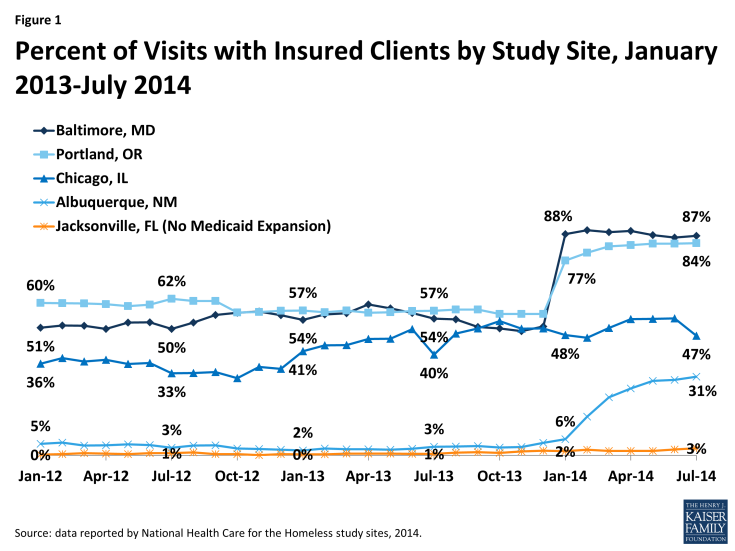Early Impacts of the Medicaid Expansion for the Homeless Population
The Affordable Care Act (ACA) Medicaid expansion offers a significant opportunity to increase coverage and improve access to care for individuals experiencing homelessness, who historically have had high uninsured rates and often have multiple, complex physical and mental health needs. This analysis provides an early look at the impact of the expansion for homeless providers and the patients they serve, building on an earlier brief examining the potential role of Medicaid expansion for this population. It is based on focus groups conducted with administrators, providers, and enrollment workers at four sites serving homeless individuals in states that have expanded Medicaid (Albuquerque, NM; Baltimore, MD; Chicago, IL; and Portland, OR) and one site in a state that has not expanded (Jacksonville, FL), as well as administrative data collected from the sites. It finds:
The Medicaid expansion has led to significant increases in coverage that are contributing to improved access to care and broader benefits for homeless individuals. Participants and data from the study sites indicate that the Medicaid expansion has led to significant gains in coverage among the individuals they serve (Figure 1). Providers reported that these coverage gains have enabled patients to access many services that they could not obtain while uninsured, including some life-saving or life-changing surgeries or treatments. Participants also identified other broader benefits for homeless individuals stemming from Medicaid coverage gains. For example, providers noted improvements in individuals’ ability to work and maintain stable housing due to better management of health conditions. In addition, participants said individuals have reduced financial stress and improved access to other services and programs, including disability benefits.
“A couple of my patients have had surgeries that have allowed them to return to work and now that they have a regular paycheck, they are able to get housed,” Provider, Baltimore
Providers reported having access to a broader array of treatment options as a result of Medicaid coverage gains among their patients. With these increased options, providers said they are better able to provide care based on the best courses of treatment rather than based on the availability of charity or discounted resources.
“It’s easier now if I say, take your insurance and go to the pharmacy…instead of me or the nurse having to fill out a bunch of paperwork and apply to the drug company or see what we have in samples and if we’re going to have enough for next time.” Provider, Portland
Gains in Medicaid revenue are facilitating strategic and operational improvements focused on quality, care coordination, and information technology. In addition, administrators indicated that Medicaid revenue gains supported staff increases and led to changing staff roles to meet increased administrative and billing needs. However, participants emphasized that, even with Medicaid revenue gains, other funding sources remain vital for supporting the full range of services needed by the homeless population.
Participants from the non-expansion site indicated that their patients remain uninsured and are continuing to face significant gaps in care that contribute to poor health outcomes. Participants also said they are facing an increasingly challenging financial situation because they are missing out on Medicaid expansion revenue gains and other funding sources are declining.
“A lot of it is just outright begging for care for these patients. You just miss that opportunity to pick it up in a more treatable stage.” Provider, Jacksonville (non-expansion site)
As homeless patients gain Medicaid coverage and are enrolled in managed care, some challenges are emerging. Participants commented that some patients are being auto-assigned to providers with whom they do not have an existing relationship and/or they may have difficulty accessing due to lack of transportation. Additionally, working within provider networks can be difficult given the complex needs of individuals, lack of transportation, and the limited experience among other providers in serving this population. Lastly, participants emphasized that prior authorization requirements and limited and/or changing drug formularies are leading to delays in care for individuals and creating substantial administrative burdens for providers.
Looking ahead, participants identified a number of priorities for meeting the health care needs of the homeless population. It was noted that maintaining coverage and educating individuals on how to use coverage will be key for shifting care patterns and reducing emergency room use. Further, maintaining other sources of funding will be key for supporting the full range of services they need. As homeless individuals are increasingly enrolled into managed care, it will be important to address their specific needs to minimize barriers to care and administrative burdens. Amid the shifting financial and delivery environment, maintaining supportive and case management services, addressing social determinants of health, and building upon interdisciplinary team-based models of care developed by homeless providers all will be key for engaging individuals in care. Finally, as broader payment and delivery reforms are implemented, it will be important for them to reflect the poorer health status and more complex health needs of the homeless population.



